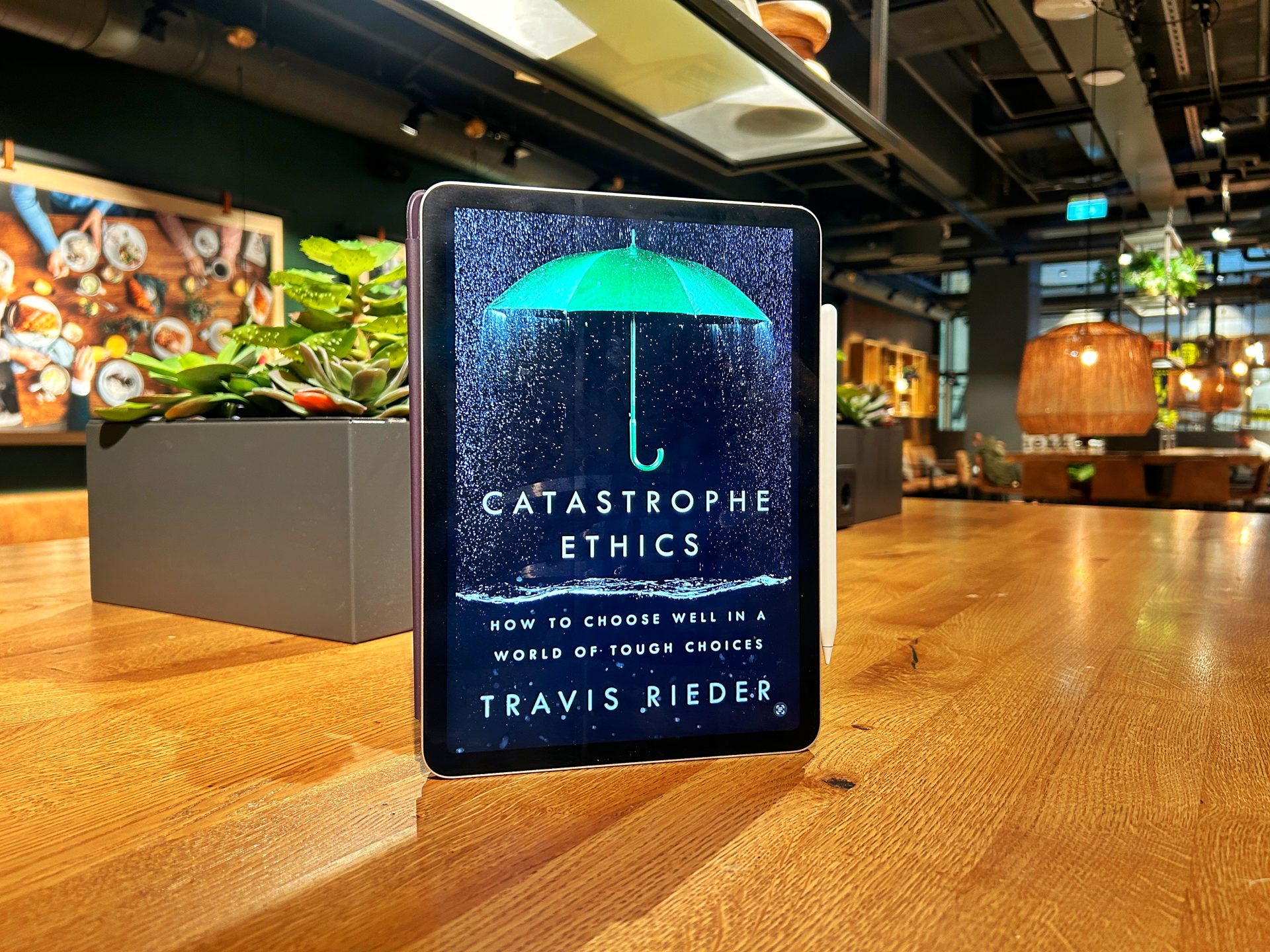We are living in an era where we face countless big problems, from climate change to structural racism, making it hard to know where to start, what to do, and what to focus on. It’s easy to feel overwhelmed and unsure about which ones to prioritize and how to take meaningful action. The sheer volume of problems can leave us feeling morally exhausted and confused. Often, we think, “What difference can I make?” Everything seems crucial, yet nothing feels impactful.
This paradox is at the heart of Catastrophe Ethics: How to Choose Well in a World of Tough Choices by Travis Rieder. The book tackles these feelings of confusion and helplessness about our moral dilemmas, where individual efforts seem insignificant against vast, collective challenges. Despite feeling responsible, our actions often appear too small to matter. This struggle between wanting to make a difference and feeling powerless can lead to a sense of moral paralysis.
But there’s hope. Rieder provides fresh perspectives on these dilemmas and helps us navigate our moral responsibilities in a world facing immense challenges. It offers insight into how we can find our place and make meaningful contributions.
Small Actions Matter
Climate change is perhaps the most significant issue of our time. Catastrophe Ethics resonates deeply with those of us who keep wonder, “Does my recycling or use of solar panels really help?” While individual actions might seem futile against such a massive problem, this book perfectly shows how these small efforts collectively make a difference.
Another example is wearing masks during the COVID-19 pandemic. Wearing a mask might not eradicate the virus, but it significantly reduces its spread. This simple act demonstrates how individual efforts, though seemingly small, can have a substantial impact. Recognizing the value of these actions can rescue us from moral nihilism and help us build meaningful lives. This notion challenges the idea that only grand gestures matter, emphasizing the cumulative effect of small, consistent actions.
Rieder also discusses many other pressing issues, such as abortion, being a vegan, and structural racism. These examples help us to bridge the gap between personal responsibility and global impact.
Living a Morally Decent Life
The main question the book asks is how to live a good, moral life when we face so many big problems. Rieder offers ideas on how to approach this, emphasizing that we each need to decide what a good life looks like for us personally.
It also explores the concept of moral dumbfounding, where people cling to moral beliefs without logical reasons, fueling polarization and hindering genuine engagement. It challenges readers to reason through their moral beliefs, even when they stem from religious teachings. By doing so, we can foster more productive and empathetic conversations about our moral duties.
Ethics, as the book explains, involves offering reasons and evidence to support moral claims. It’s not about mere opinions but about arguing for what we believe to be true. Catastrophe Ethics uses practical examples, like choosing between buying ethical products or donating to charity, to show the complexities of moral choices. It suggests that we need to balance personal actions with broader moral responsibilities. This balanced perspective helps readers understand and being realistic that both personal and collective actions are vital in addressing ethical dilemmas.
Participating in Collective Movements
Finally, Catastrophe Ethics emphasizes our role in collective movements. Bad policies and structures can lead to catastrophes, but each of us can contribute to making positive changes. This includes supporting unbiased news sources, holding politicians accountable, and advocating for systemic changes, especially if we are in positions of privilege. Understanding our role in these broader efforts helps contextualize our individual actions within larger social movements.
Conclusion
Catastrophe Ethics is a helpful guide for anyone struggling with moral challenges. It encourages us to find our own path to living a good life, aligned with our values and strengths, and to participate in collective efforts to address the world’s biggest problems. By combining personal integrity with collective action, the book inspires a more hopeful and effective approach to navigating our moral landscape.
My Favorite Bits
Acting rightly because we fear God’s punishment is the wrong kind of reason to be good.
Travis Rieder, Catastrophe Ethics: How to Choose Well in a World of Tough Choices
We have to reason about ethics, whether God commands us to do anything or not. We can’t escape our responsibility to determine what is good.
Travis Rieder, Catastrophe Ethics: How to Choose Well in a World of Tough Choices
For those who arrive at relativism because they are trying to be tolerant of others’ beliefs, what they missed is that not all beliefs should be tolerated; not all moral claims should be respected.
Travis Rieder, Catastrophe Ethics: How to Choose Well in a World of Tough Choices
Author: Travis Rieder
Publication date: 5 March 2024
Number of pages: 336 pages


Leave a Reply